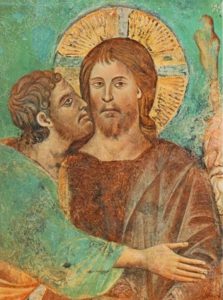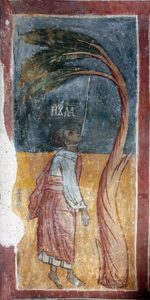Am I Judas?
Matthew 26:47-50
Introduction.
 There is a famous Medieval story told in three parts, collectively called The Divine Comedy.
There is a famous Medieval story told in three parts, collectively called The Divine Comedy.It was written by the Italian poet, Dante Alighieri.
The first part was called Inferno, and in high school, select parts of it were assigned to us to read and study.
This first part was about hell, while the other two parts were about purgatory and heaven—he was Roman Catholic, after all.
He envisioned hell as having 9 levels or circles—of course, all of this was his imagination, so we can take it with a grain of salt in terms of what these places are actually like (or even whether or not they exist, like purgatory).
Each circle was reserved for those who were guilty of a particular sin, their worst one, and it got worse and worse as you went further down—the punishment fits the crime.
In the lowest part of hell, the 9th circle, Dante writes of the sin of treachery.
It’s a cold place, and at the very center, the very worst place to be, is Satan himself, frozen from the waist down, unable to move.
He has three mouths, and he is chewing on who Dante thought were the worst traitors in history.
In the mouths to either side, he is chewing on Brutus and Cassius, two individuals who were instrumental in the betrayal of Julius Caesar.
I’m sure if Dante were an American, he would have replaced Cassius with Benedict Arnold.
In the center mouth, Satan is chewing on Judas Iscariot himself, clawing and biting him for an eternity for betraying Jesus.
Of course, that’s one man’s portrayal of what hell is like and who is suffering the worst fate he could imagine, but it shows how Judas is viewed to many people.
Judas is a traitor of the highest order.
His name has become synonymous with traitor.
It’s one thing to betray you or me.
We are sinners and we’ve done wrong, and maybe we deserve it on some level.
But to betray the Son of God who has never done anything wrong ever?
That’s the word thing imaginable!
In fact, Jesus Himself said: “woe to that man by whom the Son of Man is betrayed! It would have been good for that man if he had not been born” (Matt. 26:24).
The exact meaning of that phrase in that verse has been debated hotly, but at the very least we know that’s bad!
But, as we considered last week, if I am Barabbas, could I also be Judas? Let’s consider.
Preview.
Judas as a Disciple.
Judas as a Traitor.
Judas’ End.
Body.
Judas as a Disciple.
He is called Judas Iscariot.
This is an indication that he was a man from Kerioth, a small town in the south of Judea.
This suggests that, of those whose origins we know, he was the only one of the Twelve who was not from Galilee.
Yet through the gospel accounts, there is no indication that he is ever treated as an outsider.
This is true, even after the Lord informs them that there is a traitor in their midst.
He is always listed last among the Twelve.
We are always reminded that he was the one who betrayed Christ.
There is every indication that he was a fully fledged one of the Twelve, going out on “mission trips” with the others in the Limited Commission, performing miracles and teaching others to repent (Mark 3:14-19; 6:7-13).
(How many people do we know who have gone on mission trips and yet are unfaithful today?)
He was with the Savior every day for three years hearing His teachings and teaching it Himself, seeing His power and might and His tenderness and compassion, but it wasn’t enough for him to lay hold of eternal life.
He no doubt started as an enthusiastic disciple just like the others.
But we know Satan doesn’t come at us all at once.
It was only just before he goes to make a deal to betray Jesus that Satan first entered him (Luke 22:3).
He may have started out enthusiastic, but Satan knows our weaknesses and will exploit them until he reaches his desired end, our destruction.
As C. S. Lewis wrote in The Screwtape Letters: “Indeed, the safest road to Hell is the gradual one—the gentle slope, soft underfoot, without sudden turnings, without milestones, without signposts.”
Before we know it, we are caught up in it and feel like we’re drowning, like we can’t escape.
Let us never reach that point!
Let us identify our weaknesses and work on them before they get out of hand.
Despite all of Jesus’ teachings on money and on greed, it would appear to have fallen on deaf ears when it came to Judas.
Judas managed to get himself appointed as their treasurer (John 12:6).
Judas must have realized there was little oversight over the moneybox, so at some point in the three years he was with Jesus he began to dip his hand in there for his own personal things from time to time.
“What’s the harm?” he might have said. “It’s only a little bit. No one will notice.”
That’s how it starts, isn’t it? Something small and seemingly harmless?
Regardless, someone did notice for John to mention it.
He clearly was able to hide his activity from the others enough, however, since no one suspected he would turn traitor.
Judas as a traitor.
Judas’ greed reveals the seeds of his later treachery.
He saw how the Jewish leaders were interested in tripping Jesus up.
So he thought, “How could I get in on that?”
Like everyone else, he was likely expecting the Messiah to be a great military leader to free Israel from the Roman occupation and to reign as an earthly king.
Even the other eleven thought that right up until Jesus’ Ascension (Acts 1:6).
Maybe he thought betraying Him would motivate Him to muster His forces to take on the Romans.
Maybe Judas himself felt betrayed for believing in a Messiah who wasn’t what he thought.
His motivations aren’t entirely clear, all except for the motivation of greed, especially later when he tries to return the money.
He traded the Son of God for a small amount of money, a slave’s worth, 30 pieces of silver (Exo. 21:32).
After Satan entered him, he goes to the chief priests and strikes a bargain (Luke 22:3-6).
Of course Satan had been working on Judas a long time.
He was the weak link among the Twelve, and a chain is only as good as its weakest link.
Satan worked on him for three years (at least), culminating in this deal struck with the enemies of Christ.
He knew where Jesus and His disciples would often go, and we would seek an opportunity to betray Him as soon as possible.
At the Last Supper, Judas is there (Luke 22:21-23; John 13:2-5, 18-29).
Judas participates in the Passover meal with Jesus and the institution of the Lord’s Supper.
Jesus even washes Judas’ feet along with the other disciples.
Yet he still finds it in his heart to betray Jesus.
Even after all that, the other disciples suspect nothing.
When Jesus reveals that there is a traitor in their midst, how to the other disciples respond?
“Is it I?” “Is it I?” (Mark 14:18-19). Even Judas himself asks, “Is it I?” (Matt. 26:25). John doesn’t ask if it’s him, but he does ask who it is (John 13:25).
Jesus says it’s one who eats with them, but to John, He reveals who it is by dipping some bread and giving it to His betrayer (John 13:26).
He also told Judas himself after he asked, “You have said it.”
Satan entered Judas again, and he leaves after Jesus tells him, “Whatever you do, do quickly” (John 13:27).
But still, no one suspected even as Jesus made these bombshell revelations, since they thought He was telling Judas to go pay for something or procure something (John 13:28-29).
 Then Judas leads these wicked rulers to the garden where He prayed.
Then Judas leads these wicked rulers to the garden where He prayed.He was very familiar with Jesus’ patterns and knew He would likely be at the Garden of Gethsemane to pray (John 18:1-2).
They came to carry Him away as they would a criminal, and Judas led them straight to Him.
But Jesus knew what the plan was, and He still allowed Himself to be caught because He had a job to do—Judas merely helped to expedite it.
They couldn’t carry Him off during the day in front of the crowds because the crowds loved Him.
It was their cowardice that caused them to arrest Him at night with a fully armed detachment of troops.
The twelve of them only had two swords!
Well, these troops needed someone to identify Jesus, and Jesus says something heartbreaking as Judas approaches to do just that: “Friend, why have you come?” (Matt. 26:50).
Of course, He knows why Judas was there, but even with all that, He calls him friend.
After all, He had just gotten through telling the other eleven, “You are My friends if you do whatever I command you” (John 15:14).
Judas had been an obedient disciple up to this point, not 100%, but who is?
Judas was one of His closest friends, and He loved him despite his thieving and betrayal, He loved him!
Brothers and sisters, if Jesus could love the man who betrayed Him for a few pieces of silver, He can love you, too.
I am humbled and awed by this amazing truth!
Judas’ End.
Judas feels remorse, not repentance (Matt. 27:3-4).
He is sad, and the word to express that in Greek is rather peculiar.
The KJV says he “repented himself,” while others just say he was “remorseful” or simply “changed his mind.”
So what is the difference between repentance and remorse as the NKJV translates the words?
Trench defines it as: “He who has changed his mind [repented – slh] about the past is in the way to change everything [leading to salvation – slh]; he who has an after care [remorseful – slh] may have little or nothing more than a selfish dread of the consequences of what he has done [leading to destruction – slh].”
Paul calls this the difference between godly sorrow and worldly sorrow (2 Cor. 7:10).
While he taught others to repent in the Limited Commission, he himself would not do it, sadly stopping just short of committing to that change.
 Because of his remorse, he somehow wants to undo what he did.
Because of his remorse, he somehow wants to undo what he did.But there is no Ctrl+z on this.
The Jewish rulers have Him, and they aren’t letting Him go.
Judas throws the money back at the rulers who paid him, but they won’t accept it.
He realized Jesus isn’t going to rise up and overthrow the Romans.
He realized that He had just betrayed innocent blood after these rulers had sentence Him to death, and for what?
He betrayed Someone who only showed him kindness and love, and who did the same to others, healing them and caring for them.
But see, Judas had no intention to change his life, he just wanted to get rid of the guilt of his past betrayal—big difference.
While repentance (which leads to salvation) will get rid of that guilt, it must be accompanied by a change of one’s life for good.
Judas cannot reconcile this within himself, so he hangs himself (Matt. 27:5).
A sad end to such a promising life.
Conclusion.
So am I Judas?
I hope not! I hope you’re not, either.
But it’s a slippery slope, going from faithful disciple to traitor.
One sin leads to another which leads to another, and before you know it, you’re neck deep and can’t see a way out.
It would seem Judas didn’t confide in Jesus or his fellow disciples in the sin he was involved in, the sin of greed.
If they did know about it, they likely would not have allowed him to continue being the treasurer!
He then would not have been in the position to steal from their coffers, and it may have even tempered his desire to betray Jesus.
Let others know your faults (James 5:16) – it may sting, but it could help keep you from becoming a Judas!
But why didn’t he confess? Maybe because he was an outsider, a Judean. Or maybe because he was afraid of losing his treasury position, or worse, to be kicked out of the Twelve.
But what’s worse? To lose your position or to lose your soul?
Judas allowed his sin to run away from him, gnawing at him day in and day out until he invited Satan right in—at least twice!
As Paul writes, don’t “give place to the devil” (Eph. 4:27).
Don’t let him camp out in your heart.
You do that by allowing whatever sin you have to fester and grow.
That’s the opposite of repentance, and when you do sin, you might feel remorse, but do you repent?
Repentance requires a change of life.
The simple definition of repentance is a “change of mind that results in a change of action.”
Simple remorse doesn’t do that.
Don’t be like Judas—it’s far too easy for any of us to fall to temptation and harbor those sins.
It’s far too easy to simply feel bad for what you’ve done with no intention of changing—let’s not be like Judas!
There’s so much more that could be said, but looking at Judas’ life, looking at wrong turn after wrong turn, let’s not allow ourselves to continue going down a dangerous path like he did.
Let us truly repent and return to God this morning!
Will you turn and be saved this morning?



